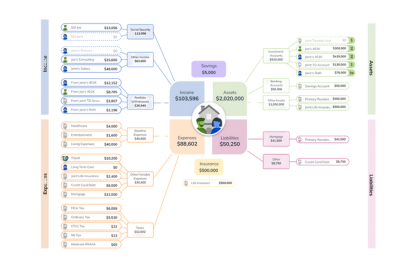What Does Liberation Day Mean for Your Financial Plan
Thursday, April 3, 2025


April 3, 2025
What Does Liberation Day Mean for Your Financial Plan

March 13, 2025
Understanding the Link Between Tariffs and Inflation


Liberation Day is the nickname for the day the U.S. unveiled a bold, sweeping shift in global trade policy. Announced dramatically, the move marked the beginning of a new era of tariffs—an era no longer defined by free trade but by reciprocal tariffs designed to rebalance America’s trade relationships.
The policy shocked many analysts with its scale:
But what does this mean for your financial plan?
At Modern Wealth, financial decisions should be grounded in understanding—not reaction. In this blog, we summarize the impact of Liberation Day in plain terms and explain how it may influence inflation, interest rates, and the broader economic outlook in ways that matter to you.
Tariffs are taxes placed on imported goods. While often discussed in political or global terms, tariffs affect consumers, investors, and the economy. They’re used to:
On Liberation Day, the U.S. imposed reciprocal tariffs targeting trade imbalances. While key items like autos (already tariffed), steel, aluminum, semiconductors, pharmaceuticals, and energy were exempt, most consumer goods are now subject to new duties.
The global reaction was swift. Trade partners and financial markets scrambled to assess the implications. But for long-term investors and financial planners, the focus should be on the economic mechanisms behind these changes—and how they ripple through spending, inflation, and risk management.
A common question is: “Don’t tariffs just mean higher prices for everyone?” The answer? Not exactly.
Tariffs raise the prices of affected goods at the margin, but they also tend to act as a fiscal drag on the economy—pulling down overall consumer spending and, in some cases, reducing broader inflation.
Example: The Gas Tax Analogy
Imagine a new $2-per-gallon gas tax, raising prices from $3 to $5. That could temporarily increase the inflation rate by 2% but also leave consumers with $270 billion less to spend elsewhere. Over time, that drop in demand across other goods and services could lower inflation more broadly.
Economists estimate that after such a shock, long-term inflation could be knocked off by about 0.7%—even though short-term prices jump.
This is how Liberation Day’s tariffs may function:
Since the Federal Reserve controls interest rates, understanding how it might respond to these new tariffs is critical for financial planning.
Here’s what we know:
Translation: Just because prices rise in the near term doesn’t mean interest rates will follow. That’s why a financial plan should be based on durable principles, not short-term assumptions.
Europe
Asia
Shipping and Logistics
Pharmaceuticals & Utilities
So how does this all tie back to your finances? Let’s break it down into actionable insights:
1. This Is a Structural Shift, Not a Passing
Trend Liberation Day wasn’t a one-time shock—it reflects a fundamental change in how the U.S. approaches trade. A well-designed financial plan should account for structural change, not just market cycles.
2. Inflation Will Be Uneven
Prices on specific imported goods may rise, but overall inflation could moderate. Tariffs reduce spending power, which slows demand and can ease price pressures across the broader economy.
3. Interest Rates May Not Spike
The Federal Reserve will likely interpret these changes cautiously, especially if demand and growth slow. That means your borrowing and investment strategy should stay balanced and informed, not reactionary.
4. Diversification Still Matters
Industries exposed to global trade (luxury, autos, retail) may see headwinds. Others (utilities, domestic services, and health care) may stay more resilient. A well-diversified investment portfolio is your best defense.
5. You Already Have a Plan—for This
At Modern Wealth, we build financial plans to be resilient—through inflation, recession, market cycles, and yes, even global tariff shifts. Liberation Day doesn’t change your goals—it just reminds us why clarity, strategy, and discipline are so important.
While we’re not here to predict the future, we can say this: Liberation Day marked a turning point. Whether this leads to new trade agreements, economic slowdowns, or greater regional self-reliance remains to be seen.
But one thing is clear: we’re not returning to the old free and open trade model without conditions.
For investors, families, and business owners, the key is to stay informed and keep perspective.
Liberation Day may have changed the global trade landscape. Still, it didn’t change the fundamentals of financial planning:
We’re here to help you do exactly that.
If you’re wondering how tariffs, inflation, or policy shifts could impact your financial plan, let’s talk. Schedule a free consultation today, and let Modern Wealth help you navigate this new era with clarity and confidence.


